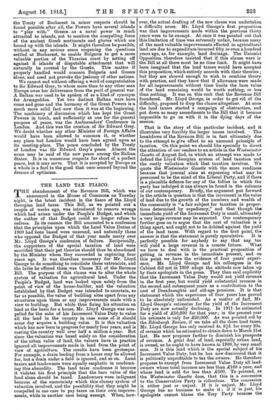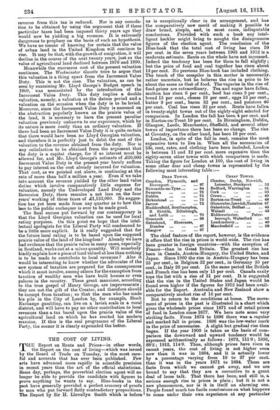THE LAND TAX FIASCO. T HE abandonment of the Revenue Bill,
which was announced in the House of Commons on Tuesday night, is the latest incident in the fiasco of the Lloyd Georgian land taxes. This Bill, as we pointed out a couple of weeks ago, was introduced to remove wrongs which had arisen under the People's Budget, and which the author of that Budget could no longer refuse to redress. In its essence the Bill amounted to a confession that the principles upon which the Land Value Duties of 1909 had been based were unsound, and naturally those who opposed the Budget of that year made merry over Mr. Lloyd George's confession of failure. Reciprocally, the supporters of the special taxation of land were mortified that their pet theories should thus be abandoned by the Minister whom they succeeded in capturing four years ago. It was therefore necessary for Mr. Lloyd George to do something to conciliate these extremists, and the bribe be offered them was Clause XI. of the Revenue Bill. The purpose of this clause was to alter the whole system of valuation for agricultural land. Under the People's Budget, land was looked upon solely from the point of view of the house-builder, and the valuation established by that Budget was intended to ascertain, so far as possible, the value of building sites apart from any structures upon them or any improvements made with a view to building. But while thus fixing his attention on land as the basis for a house, Mr. Lloyd George was com- pelled for the sake of his Increment Value Duty to value all the land in the country in case some of it should some day acquire a building value. It is this valuation which has now been in progress for nearly four years, and is costing the country well over half a million a year. But since the valuation was based solely on the consideration of the urban value of land, the valuers have in practice ignored all improvements made in land from the point of view of agriculture. The results have been grotesque. For example, a drain leading from a house may be allowed for, but a drain under a field is ignored, and so on. Land taxers and landowners were equally emphatic in condemn- ing this absurdity. The land taxer condemns it because it violates his first principle that the bare value of the land alone should be taxed. Landowners were indignant because of the uncertainty which this clumsy system of valuation involved, and the possibility that they might be compelled in one case to pay taxes on their own improve- ments, while in another case being exempt. When, how- ever, the actual drafting of the new clause was undertaken a difficulty arose. Mr. Lloyd George's first proposition was that improvements made within the previous thirty years were to be exempt. At once it was pointed out that this limitation of time was extremely unfair, because many of the most valuable improvements effected in agricultural land are due to expenditure incurred fifty or even a hundred years ago, as, for example, land drainage. The Unionist Opposition therefore insisted that if this clause were ie the Bill at all there must be no time limit. It might have been imagined that the land taxers would have accepted this proposition, which entirely accords with their theories ; but they are shrewd enough to wish to combine theory with practice, and they know that if allowance were made for all improvements without time limits the bare value of the land remaining would be worth nothing, or less than nothing. It was on this rock that the Revenue Bill foundered. Mr. Lloyd George, in order to get rid of the difficulty, proposed to drop the clause altogether. At once the land taxers started a campaign of obstruction, and put down so many amendments to the Bill that it became impossible to go on with it in the dying days of the session.
That is the story of this particular incident, and it illustrates very forcibly the larger issues involved. The breakdown of the Revenue Bill is in fact ultimately due to the attempt to give effect to an unsound principle of taxation. On this point we should like specially to direct the attention of our readers to an article in the Westminster Gazette of August 2nd, in which an attempt was made to defend the Lloyd Georgian system of land taxation and the costly valuation which that taxation involves. We quote the Westminster Gazette with the more readiness because that journal aims at expressing what may be presumed to be the mind of the Liberal Party, and if there is a plausible defence for any of the follies in which the party has indulged it can always be found in the columns of our contemporary. Briefly, the argument put forward in the article in question is that the increment in the value of land due to the growth of the numbers and wealth of the community is " a fair subject for taxation in propor- tions determined by expediency," and that though the immediate yield of the Increment Duty is small, ultimately a very large revenue may be expected. Our contemporary further goes on to argue that the cost of valuation is a thing apart, and ought not to be debited against the yield of the laud taxes. With regard to the first point, the answer is that the statement is purely speculative. It is perfectly possible for anybody to say that any tax will yield a large revenue in a remote future. What we have to deal with is the practical proposition of getting in revenue in the immediate present, and on this point we have the evidence of four years' experi- ence. Mr. Lloyd George and his colleagues in the Cabinet did not in 1909 adopt the attitude now taken up by their apologists in the press. They then said explicitly that the Increment Value Duty would not yield revenue in the first year, but would yield substantial revenue in the second and subsequent years as a contribution to the cost of Dreadnoughts and old-age pensions. It is that statement which the experience of four years has proved to be absolutely unfounded. As a matter of fact, Mr. Lloyd George's estimates for the yield of the Increment Duty are now actually declining. In 1911 he estimated for a yield of £50,000 for that year ; in the present year his estimate is only for £20,000. As was pointed out by the Edinburgh Review, if we take all the three land taxes, Mr. Lloyd George has only received 4s. 81d. for every 20s. of revenue which he estimated to obtain down to March 31st last. He now proposes further to diminish his prospects of revenue. A great deal of land, especially urban land, is owned, as he ought to have known in 1909, by very small men. It is this land which is the special subject of his Increment Value Duty, but he has now discovered that it is politically unprofitable to tax the owners. He therefore proposes to exempt from Increment Value Duty all land- owners whose total incomes are less than £160 a year, and whose land is sold for less than £500. To pretend, as the Westminster Gazette does, that this is a concession to the Conservative Party is ridiculous. The concession is either just or unjust. If it is unjust, Mr. Lloyd George has no business to make it ; if it is just, his apologists cannot blame the Tory Party because the revenue from this tax is reduced. Nor is any consola- tion to be obtained by using the argument that if these particular taxes had been imposed thirty years ago they would now be yielding a big revenue. It is extremely dangerous to prophesy on the basis of such an hypothesis. We have no means of knowing for certain that the value of urban land in the United Kingdom will continue to rise. It may be that, with the growth of emigration, it will decline in the course of the next twenty years, just as the value of agricultural land declined between 1870 and 1890. Meanwhile the enormous cost of the present valuation continues. The Westminster Gazette tries to argue that this valuation is a thing apart from the Increment Value Duty. This is not the case. The valuation, as can be seen by examining Mr. Lloyd George's Budget speech in 1909, was necessitated by the introduction of the Increment Value Duty. This duty implies a double valuation, namely, a valuation at the datum period and a valuation on the occasion when the duty is to be levied. Moreover, since the Increment Value Duty is assessed on the abstraction popularly known as the prairie value of the land, it is necessary to have the present peculiar valuation previously unknown to our experience, which by its nature is more costly than an ordinary valuation. If there had been no Increment Value Duty it is quite certain that there would have been no Lloyd Georgian valuation, and therefore it is perfectly just to debit the cost of the valuation to the revenue obtained from the duty. Nor is any satisfaction to be obtained from the argument that the duty is a capital charge, for if so interest must be allowed for, and Mr. Lloyd George's estimate of



































 Previous page
Previous page